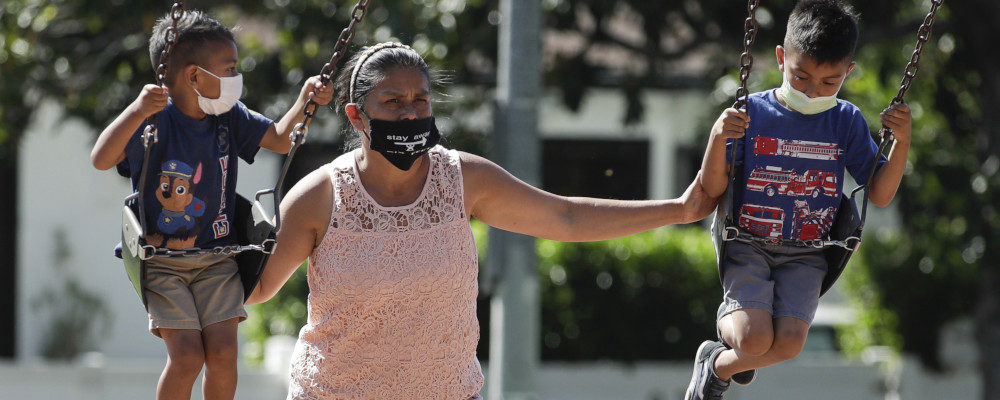In its last budget, the Ontario government quietly signalled that it will develop an long-term economic growth strategy as it looks towards rebounding from the short- and long-term impacts of COVID-19.
To date, the public policy focus has been on the underlying economic and social challenges that existed before the pandemic. It will be crucial in a post-pandemic world to think of economic policy not exclusively through the lens of the individual, but also through the most important social and economic institution that we have: the family.
The pandemic has forced Ontarians to re-examine the role of the family in our economic and social lives. The provincial government fought the minimize spread of COVID-19 by mandating that people to stay home through public health lockdowns and economic shutdowns. This has put families front and centre as the key institution that has sustained many of us. Parents took on additional roles as schools were shut down, workplaces closed, activities cancelled, and social visits banned. Siblings became best friends; grandparents and other family members have contributed childcare as schools and daycares were shuttered.
Broadly speaking, the family has been the only source of community and in-person social interaction for many of us over the past year.
Family is important at all ages and phases of life. A disproportionate number of those who lost jobs during the pandemic were younger workers, many of whom moved back with their parents to help them weather the economic storm or escape the isolation of small apartments or condos. Not to mention seniors who live with family — or alone with the support of family — who were fortunate not to be in long-term care facilities in the early days of the pandemic. The crisis exposed the often-neglected and fundamental place that family holds in our society.
Of course, family doesn’t come without its challenges.
Multi-generational homes risk transmitting COVID-19 to vulnerable members, such as seniors and those with comorbidities. The increased family time has placed stress on people in many households who (if fortunate enough to still have a job) had to juggle work, additional family responsibilities and a lot of time cooped up with significant others. Often it is mothers who bear the brunt of additional family responsibilities, which is why many have point out the significant economic impact COVID-19 is having on women.
But notwithstanding the challenges, stresses, and impacts on the family, for many who are disconnected from or do not have family, the isolation of the pandemic has been even harder.
“… families are part of the common good and society should want more
of them.”
Single mothers and fathers had to make the decision to go to work or look after their children while schools and daycares were closed, and unattached individuals dealt with isolation and alienation as they coped with lockdowns. The pandemic demonstrated the importance of the family’s role in social formation, but more importantly, showcased its resiliency in the way it sustained many of us through these lockdowns and stay-at-home orders.
Ontario policymakers should take a lesson from the increased role that the family has played in our lives and realize that a post-pandemic growth strategy cannot exclusively focus on maximizing individual economic gains, but must also emphasize ways to grow, strengthen and sustain families as economic and social units.
So how do we do this? The short answer is by encouraging more families and more children.
Raising a family is a hard thing to do: it requires sacrifice, perseverance, and a lot of patience. We need to recognize these challenges and look to make it a little bit easier to pursue these goals through better programming, incentives and a cultural recognition that supports and promotes the choice to get married and start a family.
A healthy and growing society should strive for higher marriage rates, higher birth rates and more people to help grow the economy. If we could begin increasing the birth rate it could eventually help us fill the growing labour and skills gaps and create new jobs and opportunities here in Ontario.
How might we reorient public policy towards these goals? We need to shift policymaking from exclusively relying on the individual as the basis of analysis and instead, where appropriate, look at how economic policy impacts the family unit.
The Ontario government could create a “family lens” that necessitates the government to look at how a specific policy proposal impacts the family. This would follow similar approaches that governments already use, such as a small-business lens or a gender-based analysis lens, which are common frames used by government officials in analyzing public policies and their differentiated impacts on different parts of the economy or society.
A family lens could be applied as a foundation of Ontario’s economic growth strategy with a target of increasing the formation of families and increasing the birth rate in the province. Broadly defined, this lens would examine the systemic ways that current public policy help or hinder family formation and support or deter higher birth rates, and ultimately correct for how policy analysis carried out through an individual lens can overlook important externalities.
It’s important to note that such an approach should not focus on one universal idea of the family, but rather recognize that families are part of the common good and society should want more of them – including the different forms they may take. Recognizing that families form the foundation of our economic and social lives in the policy-development process could help to ensure that economic growth and strong families become mutually reinforcing objectives.
Take housing affordability as an example.
One of the persistent challenges in Ontario has been housing affordability, specifically single-detached homes being out of reach for many middle-class Ontarians and a lack of supply of affordable family-sized apartment and condominiums. Before the government enacts a housing policy change, a zoning law adjustment or approves a development project, it should ask how this policy or development approval might influence family formation decisions including if it will lead to housing units that families would want to live in. Embedding the family at the centre of housing policy would force policymakers to better reflect the demand that exists for affordable family-friendly housing options.
Tackling the persistent and growing inequality in Ontario is another issue that would benefit from a family-centric approach.
There is evidence that the best way to avoid ending up in poverty is to follow what American researchers Wendy Wang and Brad Wilcox and have called the “success sequence.” This is the idea that there is an important sequence of life-shaping events that can alleviate poverty. First is to finish high school, second is to get a full-time job when you finish school and the third is to get married before you have children. Research by the Fraser Institute has demonstrated similar results with Canadian data.
If we could agree that the goal is family formation, we could orient our skills training and education programming accordingly. We could look to measure where high school graduation rates are weak and invest in strategies to improve these rates. We could provide real economic opportunities for those with only a high school education by increasing hands-on learning opportunities in secondary schools and investing more in our community college system. We might even try to boost marriage rates by introducing a tax credit that would allow for a portion of wedding expenses to be tax deductible.
We need new and innovative ideas if we are to grow our way out the fallout of COVID-19, and tackling economic growth by focusing on the family may generate new ideas and thinking that are needed at this moment.
We must not to forget the role family has played in our lives during COVID-19. We need to put it front and centre in Ontario’s post-pandemic policy agenda.




